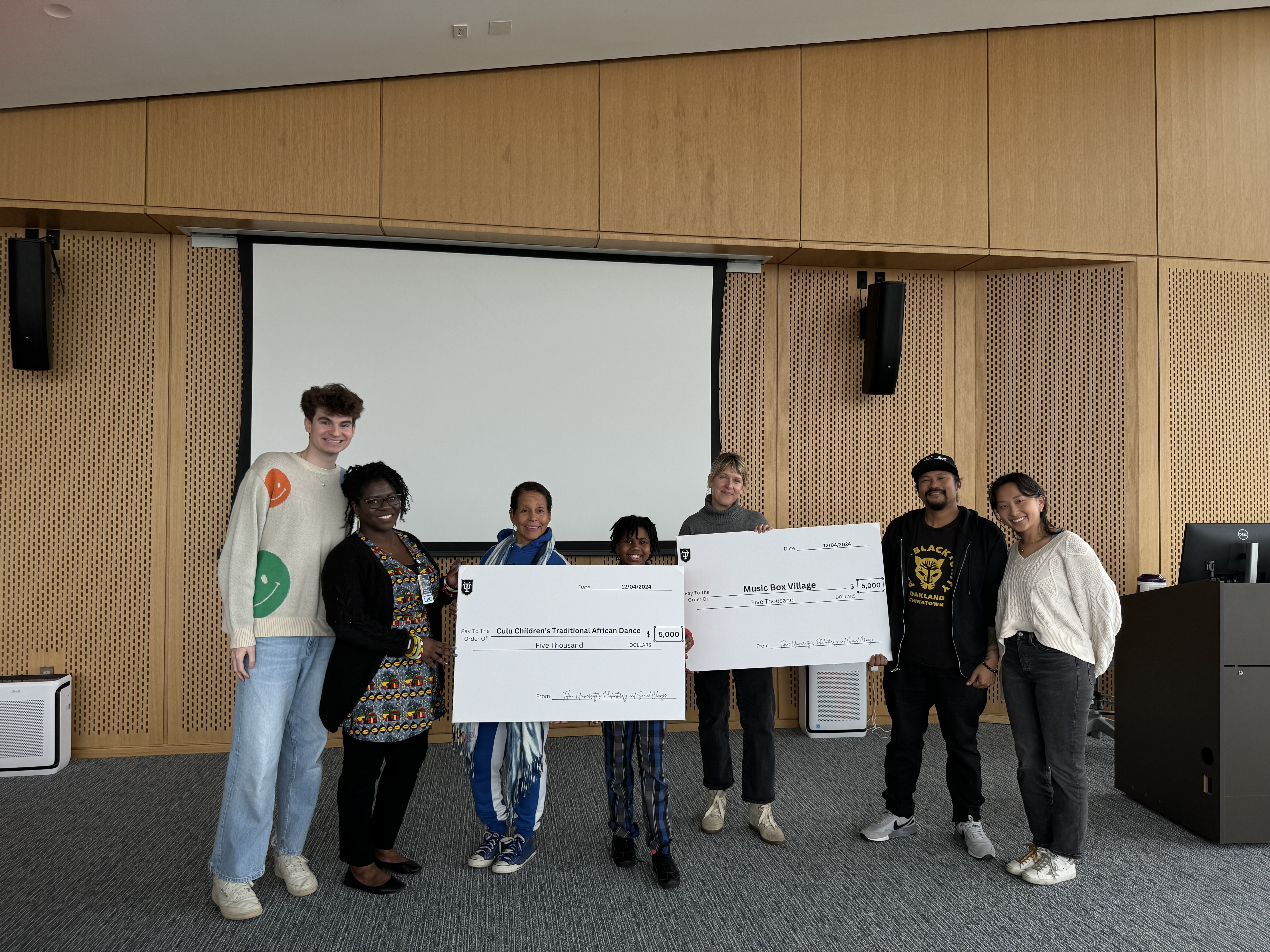As students, our education is guided by lectures, papers, and exams, but the world inside the classroom is often much simpler than the world outside of it. What would happen, though, if the two worlds collided? If the idealistic theories of the classroom clashed against the difficult practices of reality? Well, look no further than Professor Leslie Scott’s fall course, “Philanthropy and Social Change.”
“Philanthropy and Social Change” is a service-learning course that uses experiential philanthropy to study the nonprofit sector, civil society, and social justice. Students in the course act as grant funders, using a $10,000 grant from Doris Buffett’s Learning by Giving Foundation to fund not-for-profit performing artists in New Orleans. This “learning-by-doing” approach forces students to confront the power and privilege of managing scarce resources in the face of abundant need.
On Wednesday, December 4, the course culminated in its student-led award ceremony, which brought together the students from the “Philanthropy and Social Change” course, Tulane faculty and staff, and the award recipients. Checks for $5,000 were presented to the two recipients of the class grant: Music Box Village and Culu Children’s Traditional African Dance Company.
Music Box Village is the flagship project of New Orleans Airlift and opened in 2011. A whimsical village of artist-made interactive “musical houses” and architecture, this grant will help fund a Creative Industries Internship Program — helping young adults in New Orleans to learn technical skills in music and art event production.
Culu Children’s Traditional African Dance Company — the organization I selected to represent during the course — is a children’s dance organization founded by New Orleans native Mariama Curry in 1990. Culu is dedicated to the documentation, preservation, promotion, and education of traditional African folklore. The company attends a traditional African dance conference each year and puts on its own annual conference in New Orleans during the summer. This grant will help fund their 35th anniversary conference, “A Visit to Africa.”
With tears in their eyes, both recipients accepted their checks and thanked the class for their work. Leah Hennessy, Interim Executive Director of Music Box Village, shared her appreciation for the students in the course who volunteered at Music Box by working the door, scanning tickets, and even doing manual labor to set up for shows. After some tough times, she explained, this grant was “everything.” Curry also became emotional when expressing her gratitude for the award. “This is the largest amount of money we’ve ever gotten,” she said. “You work so hard but are rarely acknowledged for your work. So, when you are,” as she wiped tears away, “it means a lot.”
The award ceremony was a satisfying finale for an intense semester of advocacy and deliberation. While only 2 applicants received funding, the class began with 26. The course itself was composed of 26 students, each tasked with representing and advocating a community partner. Throughout the semester, students met in person with their community partners to craft a student-led presentation to request funding. This is what made the course unique — instead of applicants writing their own application, students committed time to learning about their partner and created a grant application for them. This is also what constituted the service-learning component of the course. Around 15 hours were spent meeting with partners and developing their presentations. The remaining 5 hours were spent volunteering. Since most applicants were not funded, volunteering ensured that students still gave their community partner something impactful — their time.

Students were also responsible for creating their own adjudication process. All decisions, from creating the process to selecting the winners, were decided by a majority vote. Ultimately, we decided that 1, 2, or 3 partners would be awarded. The minimum amount that could be awarded was $3,000, while the maximum amount that could be awarded was the full $10,000. The award would be unrestricted, meaning the recipients could use the funds on whatever they needed (programming, operations, etc). We created our own weighted rubric, which assessed criteria like use of funds, necessity and urgency, and impact. The overall grant funding process was conducted over 3 rounds.
I feel so lucky to have been a member of the fall 2024 “Philanthropy and Social Change” course. I had taken courses about nonprofits and development at Tulane before, but nothing compared to this course. I saw firsthand the inequities of how grant funding operates in the United States, with many large foundations requiring lengthy written grant applications, extensive financial documents, and, for recipients, reports on exactly how the grant was used. This course challenged those norms. We did not make our community partners take time out of their busy lives to write a grant application, nor did we require them to prove finances or share every detail of how they intended to use the funds. This approach, trust-based philanthropy, was the bedrock of our class’s approach.
This extremely personal process allowed me to have a service-learning experience that I never could have imagined. I am leaving this course with new relationships and connections that will last long past this semester. I have had the pleasure of forming an authentic relationship with Mariama and the mothers and children of Culu. I helped them make marketing materials for their shows, and we celebrated their award at a Friday night dinner. I plan on attending their annual conference and seeing the beautiful art our class funded come to life on stage!

